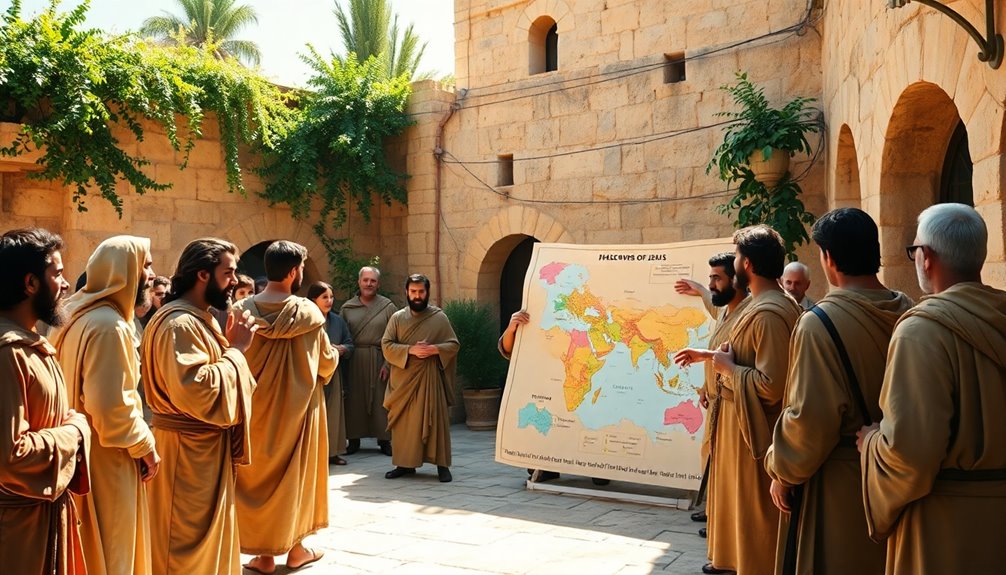The Great Commission, found in Matthew 28:19-20, is Jesus' command for you to go out and spread the gospel to all nations. It's a call to make disciples, baptize them, and teach them to obey His commands. Each believer, including you, shares the responsibility of this mission, emphasizing the urgency of reaching both local communities and distant lands. Many often overlook local evangelism while focusing on global outreach, but both are crucial. By engaging in daily acts of kindness and sharing your faith, you embody this mandate. There's so much more to explore about how you can fulfill this mission.
Key Takeaways
- The Great Commission is found in Matthew 28:19-20, instructing believers to make disciples of all nations.
- It emphasizes the importance of baptizing and teaching obedience to Jesus' commands as a core responsibility.
- The command extends both locally and globally, highlighting the need for evangelism in every community.
- Misinterpretations can neglect local outreach, despite over 3 billion people remaining unreached by the gospel.
- It serves as a foundational directive for fulfilling God's universal salvation plan through active participation in spreading the gospel.
Introduction

The Great Commission, found in Matthew 28:19-20, is a pivotal moment in Christian history that commands believers to take action. After His resurrection, Jesus instructed His disciples to "go, make disciples of all nations, baptizing them" and teaching them to obey His commands. This directive emphasizes the necessity of evangelism, urging you to actively engage in spreading the gospel and establishing Christian communities around the world.
As a believer, you're entrusted with the responsibility of sharing the good news. The Great Commission isn't just a suggestion; it's a foundational directive that underlines your role in fulfilling God's desire for universal salvation. Whether you're sharing your faith with a neighbor or participating in missionary efforts abroad, each act of discipleship contributes to a larger mission.
The phrase "Great Commission" has become synonymous with early Christian efforts to spread the gospel, highlighting the urgency of making disciples. By embracing this command, you align yourself with a rich tradition of evangelism that has shaped Christian theology and practice for centuries.
Ultimately, the Great Commission calls you to a life of purpose, inviting you to be an active participant in God's transformative work in the world.
Biblical Mandate for Discipleship

When you explore the Biblical mandate for discipleship, Matthew 28:19-20 stands out as a clear directive from Jesus.
This passage not only calls you to make disciples but also emphasizes the importance of teaching and nurturing others in their faith.
Understanding both primary and secondary Bible references can deepen your grasp of this essential command.
Primary Bible References
Jesus' command in the Great Commission serves as a powerful mandate for discipleship, urging believers to actively engage in sharing their faith. In Matthew 28:19-20, Jesus instructs His disciples to "go, make disciples of all nations," emphasizing the importance of baptism and teaching in the process. This foundational scripture highlights not just the act of making disciples, but the call to immerse them in the life of faith.
Mark 16:15 reinforces this mission, commanding you to "go into all the world and preach the gospel to all creation." This directive places evangelism at the heart of discipleship.
Luke 24:46-47 adds depth by emphasizing the need to preach repentance and forgiveness of sins, starting from Jerusalem and extending to all nations.
In John 20:21, Jesus sends His disciples, mirroring the sending by the Father, which emphasizes active participation in His mission.
Acts 1:8 further clarifies your geographical responsibility, instructing you to be witnesses in Jerusalem, Judea, Samaria, and to the ends of the earth.
These primary Bible references collectively shape your understanding of discipleship as an active, expansive, and vital call to action.
Secondary Bible References
Numerous secondary Bible references further underscore the biblical mandate for discipleship, providing additional insights into its significance and scope.
In Mark 16:15, Jesus commands you to "go into all the world and preach the gospel to all creation," emphasizing that the Great Commission isn't limited to a specific group but extends to disciples of all nations. This global call reflects the heart of discipleship, urging you to share the message of Christ everywhere.
Luke 24:47 reinforces this by highlighting the need to preach repentance and forgiveness of sins in Jesus' name to all nations.
Acts 1:8 assures you that you'll receive power when the Holy Spirit comes upon you, enabling you to be His witness not just locally, but also globally—extending to the ends of the earth.
Moreover, 2 Corinthians 5:20 identifies you as an "ambassador for Christ," detailing your role in reconciling others to God.
This responsibility is integral to the ongoing process of discipleship, as you actively engage in fulfilling the Great Commission and helping others experience the transformative power of faith.
First-Century Jewish Missionary Practices

First-century Jewish missionary practices laid a crucial foundation for the spread of Christianity, emphasizing the importance of sharing God's message with both Jews and Gentiles. Rooted in the Hebrew scriptures, these practices fulfilled God's covenantal promise to Abraham.
Rabbis traveled extensively, using synagogues as central hubs for worship and teaching, which became essential for early Christian evangelism.
Jewish teachers often employed parables and storytelling to convey spiritual truths, a method Jesus commanded His disciples to use as well. This relatable approach helped people connect with profound concepts more easily.
Additionally, the idea of "Shaliach," or authorized agents, allowed individuals to act on behalf of their religious communities, paralleling the commissioning of the apostles in the Great Commission.
The early church embraced these communal practices, including prayer, study, and outreach, which created a solid foundation for the spread of the gospel throughout the Roman Empire.
Cultural Context of Discipleship

In the cultural context of the Great Commission, discipleship reflects the rich Jewish tradition of rabbinical teaching, where followers closely imitated their rabbi's teachings and way of life. This deep-rooted practice emphasizes that being a disciple isn't just about learning; it's about embodying the teachings of Jesus in your daily life. When you commit to being a disciple, you're making a formal commitment to Jesus and His community.
The early disciples often came from socio-religious backgrounds that marginalized them, highlighting Jesus' inclusive message that invited diverse individuals into a new spiritual family. This invitation underscores the importance of community in discipleship, as it's not merely about personal belief but actively participating in the lives of others.
The Great Commission commands you to "go, make disciples," which signifies that discipleship involves both teaching and communal engagement.
Understanding this cultural context helps you grasp the urgency of the Great Commission. It's a transformative journey, aiming for a relational and participatory faith that goes beyond just transferring knowledge. By embracing this understanding, you align yourself with the original intent of Jesus' call to discipleship.
Misunderstanding Mission Scope

You might think the Great Commission only applies to missionaries in far-off lands, but that's a common misconception.
It's essential to recognize that your mission starts right in your own community, engaging those around you with the gospel.
Understanding this cultural relevance can empower you to make a real impact both locally and globally.
Debunk Common Misconceptions
The Great Commission often gets misunderstood as a call strictly for overseas missions, but this perspective overlooks the vital role of local evangelism. Many think you need formal training or special qualifications to fulfill the Great Commission, yet every believer is called to share the gospel in their everyday life. This responsibility isn't just for pastors or missionaries; it's a directive for all Christians to actively participate in making disciples.
Another common misconception is that the Great Commission was fully accomplished in the first century. This belief ignores the ongoing need for evangelism, as numerous regions and people groups still remain unreached today. Romans 10:14-15 highlights the necessity of spreading the gospel, reminding us that many haven't yet heard the message of Christ.
Misunderstandings about the mission's scope can foster apathy in evangelism, but the biblical call is clear: every believer must engage in spreading the gospel until every nation has heard.
Embrace your role in the Great Commission, knowing that your efforts, whether local or global, play a crucial part in God's plan for salvation.
Cultural Relevance of Evangelism
Cultural relevance plays a crucial role in effective evangelism, yet many Christians overlook its importance. The Great Commission, as outlined in Matthew 28:19-20, instructs you to make disciples of all nations, emphasizing that evangelism extends well beyond your local context.
Unfortunately, many believers misinterpret this mission, seeing it as a call to focus solely on overseas efforts while neglecting the diverse communities right at their doorstep.
Cultural barriers can often hinder your ability to connect meaningfully with different groups, leading to misunderstandings and reluctance to engage.
It's vital to recognize that over 3 billion people remain unreached by the gospel, highlighting the urgent need for evangelism both locally and globally.
You can't afford to adopt a passive approach, waiting for others to fulfill the Great Commission. Instead, embrace the challenge of cultural relevance in your outreach efforts.
Daily Acts of Kindness

You can make a big impact by volunteering in local outreach and community service initiatives.
These daily acts of kindness not only help those in need but also strengthen your connection to your community.
Volunteer in Local Outreach
Volunteering in local outreach through daily acts of kindness not only strengthens community bonds but also exemplifies the spirit of the Great Commission. By engaging in simple tasks like delivering meals to the elderly or participating in neighborhood clean-up days, you show love and care, reflecting the call to serve others as Christ did.
These small actions can create a ripple effect, fostering a positive environment and enhancing relationships within your community.
When you take part in local outreach initiatives—like tutoring children or organizing community events—you can share your talents while building connections that may lead to meaningful spiritual conversations.
Studies indicate that communities with active volunteer programs experience increased trust and collaboration among residents. This aligns perfectly with the mission of making disciples through tangible actions.
Regularly participating in local outreach not only fulfills the Great Commission but also brings personal growth and fulfillment. Many volunteers report feeling happier and more purposeful as they serve others.
Community Service Initiatives
Community service initiatives often manifest through daily acts of kindness that directly impact those around us. When you volunteer at local food banks, you're not just providing meals; you're demonstrating the practical application of the Great Commission through service.
Engaging in neighborhood clean-up projects beautifies your community and fosters a sense of responsibility, reflecting the Christian call to serve others. You can also participate in mentorship programs for youth, empowering the next generation and aligning with the Great Commission's directive to teach and guide others in their spiritual journey.
Organizing clothing drives for the homeless supports vulnerable populations, embodying the love and compassion Jesus Christ demonstrated in His ministry. Additionally, forming small groups to pray for and support local families facing hardships can create a strong community bond.
This effort encourages a culture of kindness and outreach, crucial for fulfilling the Great Commission. Every small act counts, and your involvement in these initiatives can transform lives, including your own. By committing to these daily acts, you're not just serving your community; you're living out your faith and reflecting the heart of Jesus to those in need.
Practical Steps for Engagement

Many believers find that engaging with the Great Commission begins with simple, everyday practices. To foster personal growth and deepen your understanding of its directives, start by dedicating time for daily prayer and scripture reading. This won't only strengthen your faith but also equip you to witness effectively.
Participating in local community service projects allows you to demonstrate love and support, embodying Christ's teachings in practical ways. These actions create natural opportunities to share your faith with others.
When you recount personal faith stories to friends and family, you open the door for meaningful discussions about the gospel and its relevance in daily life.
Consider joining or creating small group discussions focused on the Great Commission. These groups enhance collective understanding and provide accountability among believers.
Additionally, supporting global missions through donations or volunteering helps fulfill the Great Commission across nations, allowing you to contribute to outreach efforts and witness to those far beyond your local community.
Additional Resources

There are several valuable resources available that can enhance your understanding and application of the Great Commission. One of the best places to start is BibleGateway.com, which offers access to Bible passages in 71 languages and 226 different versions. This diversity allows you to dive deep into your Bible study, gaining insights into the Great Commission's meaning and implications for evangelism.
You can explore articles and reflections specifically focused on the Great Commission, enriching your perspective as you engage with these teachings. The site's advanced search functionality makes it easy to find specific verses related to the Great Commission, helping you connect scripture directly to your life and mission.
Additionally, BibleGateway.com provides daily devotionals and reading plans that encourage you to incorporate the Great Commission into your everyday life.
You can also join community features like forums and discussion boards, where you can connect with others who share your interest in evangelism. These collaborative spaces allow for a deeper exploration of the Great Commission, fostering a supportive environment for growth and learning.
Utilizing these resources will equip you to live out the Great Commission more effectively.
Frequently Asked Questions
What Is the Great Commission According to the Bible?
The Great Commission, according to the Bible, is Jesus' command to you as a believer to spread the message of His love and salvation.
It encourages you to go out into the world, making disciples and baptizing them in the name of the Father, Son, and Holy Spirit.
You're called to teach others about His commands, empowering them through the Holy Spirit, and ultimately reflecting God's desire for everyone to know Him.
What Are the Three Commands of the Great Commission?
The three commands of the Great Commission are vital for your role as a believer.
First, you're called to "Go," actively sharing the gospel with everyone.
Next, you should "Baptize" new followers, welcoming them into the faith through water baptism.
Finally, you need to "Teach" these individuals about Jesus' teachings, encouraging them to obey His commands.
Together, these steps guide you in making and nurturing disciples in your community and beyond.
What Was the Purpose of the Great Commission?
The purpose of the Great Commission is to empower you to spread the message of Jesus Christ to all nations.
It urges you to actively make disciples, baptize them, and teach them to obey His teachings. This directive highlights your responsibility to share the gospel, ensuring everyone has the opportunity to hear about salvation.
How Do I Fulfill God's Great Commission?
To fulfill God's Great Commission, start by deepening your relationship with Him through regular prayer and scripture reading.
Get involved in community service to show Christ's love and share your faith stories with friends to spark conversations.
Join small groups or Bible studies for support and accountability, and consider volunteering or donating to global missions.










